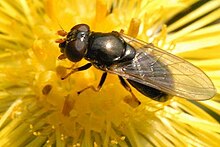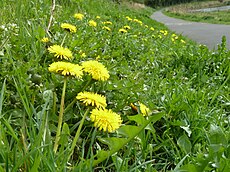| Cheilosia pagana | |
|---|---|

| |
| Male | |

| |
| Female | |
| Scientific classification | |
| Domain: | Eukaryota |
| Kingdom: | Animalia |
| Phylum: | Arthropoda |
| Class: | Insecta |
| Order: | Diptera |
| Family: | Syrphidae |
| Genus: | Cheilosia |
| Species: | C. pagana |
| Binomial name | |
| Cheilosia pagana (Meigen, 1822) | |
| Synonyms | |
Cheilosia pagana is a Holarctic species of hoverfly. Like most Cheilosia it is black, and because of this may often be overlooked as a hoverfly. One identifying feature is a large red to orange 3rd antennal segment.
Description
For terms see Morphology of Diptera
Wing length 4.75-8·5 mm. Antennae with third segment clear orange and very large:no furrow. Frons flat in male. Thoracic pubescence variable. Female scutellum entirely black. Legs part yellow. Tarsi 1 with pale central segments pale. Part of the pagana species group.
Distribution
Present in most of Europe and in the eastern Palearctic realm. East to Siberia. Nearctic

Biology
Habitat: coniferous and deciduous woodland, unimproved grassland, along hedgerows in farmland and at roadsides. Scrub and carr. Flowers visited include yellow composites, Ranunculaceae, white umbellifers, Allium ursinum, Anemone nemorosa, Fragaria, Potentilla erecta, Primula, Prunus spinosa and Salix. Flight period is from May to September. In southern Europe, on the wing from mid March. Larvae are known to inhabit semi-liquid, decaying tissue of the roots of plants. There is a rearing record from decaying roots of Cow Parsley.
References
- ^ Meigen, Johann Wilhelm (1822). Systematische Beschreibung der bekannten europäische n zweiflugeligen Insekten. Hamm: Dritter Theil. Schulz-Wundermann. pp. x, 416, pls. 22–32. Retrieved 14 April 2019.
- ^ Stubbs, Alan E.; Falk, Steven J. (1983). British Hoverflies: An Illustrated Identification Guide. British Entomological & Natural History Society. pp. 253, xvpp.
- Van Veen, M.P. (2004). Hoverflies of Northwest Europe, Identification Keys to the Syrphidae (hardback). Utrecht: KNNV Publishing. p. 254. ISBN 90-5011-199-8.
- Van der Goot,V.S. (1981) De zweefvliegen van Noordwest - Europa en Europees Rusland, in het bijzonder van de Benelux. KNNV, Uitgave no.32: 275pp. Amsterdam.
- Bei-Bienko, G.Y. & Steyskal, G.C. (1988) Keys to the Insects of the European Part of the USSR, Volume V: Diptera and Siphonaptera, Part I. Amerind Publishing Co., New Delhi. ISBN 81-205-0080-6.
- Coe, R.L. (1953) Diptera: Syrphidae. Handbks.ident.Br.insects, 10(1): 1-98. R.ent.Soc.London. pdf Archived 2018-10-04 at the Wayback Machine
- "Fauna Europaea". fauna-eu.org. Retrieved 2022-08-01.
- Peck, L.V. (1988) Syrphidae. In: Soos, A. & Papp, L. (eds.) Catalogue of Palaearctic Diptera, 8: 11-230. Akad.Kiado, Budapest.
- "Nearctic Syrphidae Checklist". Canacoll.org. Retrieved 2022-08-01.
- "Cheilosia pagana species information". GBIF. Retrieved 2023-02-02.
- Speight, M.C.D. (2011). "Species accounts of European Syrphidae (Diptera)" (PDF). Syrph the Net, the Database of European Syrphidae. 65: 285pp.
- de Buck, N. (1990) Bloembezoek en bestuivingsecologie van Zweefvliegen (Diptera, Syrphidae) in het bijzonder voor België. Doc.Trav. IRSNB, no.60, 1-167.
| Taxon identifiers | |
|---|---|
| Cheilosia pagana |
|
This article relating to Eristalinae is a stub. You can help Misplaced Pages by expanding it. |